A Grave for Two Read online
Page 11
Once again she interrupted herself. She had started to feel cold. All the same she remained seated, with her eyes half closed and unfocused.
‘Hege’s will to win comes from external forces,’ she said slowly, as if she didn’t entirely believe what she was saying. ‘She wins for her father. It’s his dreams she’s fulfilling. Not her own.’
Selma tried to recollect exactly how their conversation had gone. Word for word. She couldn’t manage it completely, but for some reason she had been left with the impression that Hege Chin Morell was more upset on her father’s behalf than her own.
And her mother’s.
Her mother had been dead for fifteen years.
Einar shook the sleeping bag and drew it all the way up to his armpits.
‘I can’t make out how you know that,’ he said, refilling his mug from the thermos flask. ‘But if you’re right, then you’re on to part of the most interesting aspects of casuistic victimology.’
Once again Selma recognized the peculiar expression from The Investigator’s ABC. It must be one of the many turns of phrase he had quite simply made up. She got to her feet and slapped her thighs. It was probably plus one or two degrees Celsius here underneath the bridge, but the air was raw.
‘You know,’ Einar went on without noticing she was gathering up her belongings in order to leave. ‘People think an investigator’s only task is to find a perpetrator. But it’s not like that. Cheers!’
The man must have mucous membranes made of thick leather. He drank down all the coffee in one gulp. Wiped his mouth with his sleeve and let off a loud fart of satisfaction down into the sleeping bag.
‘Sometimes, Mariska, it’s not obvious who is the victim of a crime. Most often, qui bono is a sensible question. Who gains from the crime? But sometimes, Mariska, you have to ask yourself …’
He lifted his arms out to one side, as if preparing to deliver a speech to an enthusiastic assembly.
‘… who loses most by the result of the crime? If you find the answer to that, you’ll find the real victim in this case.’
He dropped his arms abruptly.
‘Are you leaving?’
‘Got to run. Home. It’s late.’
‘Are you running all the way to Ormøya now?’
Selma did not answer. She stuffed her running jacket into her rucksack – it was too cold to change.
‘You’ll be back soon?’ Einar asked.
‘Of course I will.’
‘And, don’t forget …’
Yes.’
She slung the rucksack on her back and fastened the belt before leaning over him and giving him a hug.
‘I did the right thing,’ he murmured into her shoulder. ‘Didn’t I? It was right to kill him?’
‘You did absolutely the right thing,’ Selma whispered in return. ‘That bastard deserved to die.’
THE WALL
The room had grown even smaller.
He had paced it out several times. When he first woke in here, not understanding anything, and with no idea what had happened, the cell had measured six paces in length and four wide. The door with the hatch was on the long wall, just beside the pipe where the water trickled out and down into the nauseating drain where his excrement now at least slipped easily through the grate. He had constant diarrhoea.
The cell had become square. Four paces in each direction. One of what had been the end walls, the moving wall, was now almost all rough board. He had torn off all the plaster. Last night, or earlier today – it was impossible to know what was what – he had been wakened by walking in his sleep. He had been squatting beside the heap of broken material, chomping on a piece of plaster, when he suddenly realized he was awake.
In the last few days, or hours, he had tried to work loose the rough boards in the corner where the most dangerous wall met the one constructed of brick. There was a gap of a couple of millimetres in that spot, so that the wall could move forward each time the infernal machine was activated on the other side. However, it was useless.
His hands were aching. His backside was sore, and he had problems sitting down. He never slept for very long, he imagined, even though it was difficult to know for certain. His sleep was filled with dreams, most of them about being in a desert, fleeing from incredible monsters that finally caught him, when he was wakened in panic by his own screams.
The second-worst thing about this place was that it was locked.
The third-worst was that there were no loose objects there, apart from his food, some straw and himself. Nothing to use. Nothing to hold. Nothing to move, no movement to follow with his eyes.
The fourth-worst was being naked.
He still had no clue about what had happened.
Even now, he did not know what he had done.
What’s more, he could not recall anything except being on his way to his car in the garage in Ivan Bjørndals gate in Sagene when all at once his world had gone up in smoke.
The very worst thing about this place was that the room was getting steadily smaller and could presumably collapse to almost nothing.
The machine came to life again out there, and he began to cry.
MAGGI
The little heart beside the doorframe was so beautiful. Painted with red nail varnish, at a six-year-old child’s eye level. Maggi had spotted it the first time she had cleaned in here, only a few weeks after the lady of the house had passed away. Her initial impulse had been to scrape it off. She would prove herself worthy of the job. Even though she had come with good references, Jan Morell seemed both sceptical and strict. She was given a three-month trial period, and the bathroom had to shine. Just as she was about to remove the hard lacquer from the surface with a stove scraper, she changed her mind. Instead she covered the heart with a length of sticky tape and scrubbed down the rest of the room.
She had continued to do that.
She also took care of the doorframe. While the rest of the bathroom was always washed down with water and detergent, bleach and other chemicals, she merely wiped the doorframe painstakingly with a dry-fibre cloth over the wood where Hege’s growth chart was drawn in pens of various colours.
Maggi enjoyed being with the little Morell family. Before she was employed there, she had been in Norway for six months. She’d had cleaning jobs with eleven families. All paying on the black market. Only one of them had bothered enough to learn her name.
Magdalena Wajda.
It was eleven-year-old Hege who had shortened it to Maggi, which had delighted Magdalena. And the little girl’s father had paid her wages. Proper wages, into her bank account each month, in accordance with a contract that they had renegotiated every second year. The pay was good. If somewhat less than illegal casual workers received, she had in addition free board and lodgings in a cosy bedsit in the basement. She acquired a pension. She had rights to sickness benefit, though she had never taken a single day off work. With preparing food and washing clothes as well as cleaning the house, her work was varied and far less physically demanding than driving from address to address to scrub floors for people she never met.
Maggi loved Hege.
Jan Morell was strict and sometimes condescending, even though he treated her fairly. The man had seemingly never been attached to any new woman after becoming a widower. If he had, then he kept her at a distance, and that was just as well. The timber house in Vettakollen was Maggi Wajda’s domain. She took a fortnight’s holiday in her homeland every summer, plus a Christmas break with her sister in Wroclaw, but otherwise stayed put in the little cul-de-sac up on the fringes of the forest.
Hege was a quiet child. Mild-natured. When Maggi met her for the first time, she kept two hamsters in a cage in her room. They were called Kavring and Jonatan, even though they were both females. The very first night, after a slightly taken-aback Maggi had agreed to put Hege to bed, the little girl had come in to her with the cage. Kavring and Jonatan would stay with Maggi for three nights. To bring her comfort and keep her company in this n
ew, strange house.
The youngster had been used to being read to. Obviously not by her father. Maggi’s Norwegian language skills consisted of around one hundred words when she arrived, so for the first few months the eleven-year-old had read to her. After six months, they swapped roles.
Hege became the child Maggi had never had. She knew that she had by no means replaced Katinka Morell, but that didn’t matter. Hege often demonstrated her fondness for her with the occasional hug and lots of smiles. A few confidences, at least in her teenage years, and little signs of thoughtfulness. In the initial period, Maggi received drawings, home-made Christmas decorations and little notes with hearts attached to her bedsit door with something Hege called ‘teacher’s chewing gum’. Later, when her skiing career took Hege around the globe for two-thirds of the year, she always brought some small gift home. Never to her father. Always to the home help.
Maggi worked in silence, lived a quiet life and felt an unassuming, deep love for a young woman whose mother she was not. She didn’t often plan more than a couple of months ahead. Now she was approaching sixty years of age. Occasionally, especially when she had switched off the light to go to sleep, thoughts of life as a pensioner crossed her mind. As a rule she managed to shrug these off, and fall asleep.
The heart in the bathroom had faded after all these years. Even though Maggi looked after it well, it was unavoidable. At one time she had tried to freshen it up with a new coat of nail varnish, but fortunately realized in time that it looked awful. She managed to remove the new varnish before it hardened.
Hege had not done anything wrong. Maggi knew that. It wasn’t only the Norwegian media that had gone berserk over last week’s revelations, for some of the Polish newspapers had also covered the story extensively. Justine Kovalčik, the senior member of the Polish women’s national team, had found a fresh opportunity to cast malicious aspersions at her Norwegian competitors.
That riled Maggi.
Not that she knew much about either cross-country skiing or Kovalčik, but she knew her Hege Chin. Not on her life would she do anything wrong. Hege didn’t even cheat at Monopoly when she was aged eleven.
The bathroom did need to be renovated. Jan was right about that. The grout in the shower alcove had begun to loosen a long time ago. Maggi suspected it had started to get waterlogged behind there, since it did not take too many hours after each wash with bleach solution for it to smell a bit musty. The silicone seal between the basin and the wall had yellowed, with tiny spots of something Maggi assumed was some kind of mould. It couldn’t be eradicated, no matter how much she scrubbed.
She heard rhythmic, faint thuds from the basement. Hege had been exercising for nearly two hours down there and would soon come up for a shower. Maggi would have to hurry.
The grate on the air vent had fallen on the floor.
That had happened a couple of times before. Really, this bathroom would have to be upgraded soon. It was at least twenty years old: she could read the date on the window trim.
Maggi put the metal grate in the basin, finished off and returned the detergents to the cupboard. Taking hold of the grate, she stepped up on to the toilet seat and prepared to do something she’d had to do from time to time before.
Attach the damned grate.
She saw that there was something inside it.
There shouldn’t be anything in the air vent. Once a month, she vacuumed both the grate and the round pipe inside, as far as she could reach before it curved upwards. In the past, when Hege was younger, she had hidden her diary in here. Maggi had always put it back after cleaning, and never said a word. Nine days ago, it had been clean as a whistle in there.
And empty.
Without a moment’s thought, she thrust her arm in and took out the offending object.
It was a tube. It looked like an ointment. Or cream. It was practically all used up. Maggi could not fathom how it had ended up there. The writing on the contents list was so tiny that she had to screw up her eyes.
She understood immediately. Clostebol. The name of the active ingredient had been mentioned in both the Polish and Norwegian newspapers.
Her mind felt blank, and she pushed the tube into her apron pocket before clamping the grate in place and hopping down from the toilet seat.
She was so dizzy she had to put her hands flat on the wall.
She tried to think clearly, but the incomprehensible discovery made that impossible. Her pulse hammered in her ears, and a sour taste forced its way up through her gullet, making her feel queasy.
She heard footsteps in the living room. Not the skipping, fast, running dance of before. One week ago, life had changed dramatically for Hege, and therefore also for Maggi. She rushed from the bathroom, through the bedroom and into the hallway, and had just managed to reach the kitchen before Hege entered from the living room.
The girl looked at her. Her training session had painted red half-moons on her cheekbones.
‘Thanks,’ she said quietly.
‘For what?’
‘For cleaning the bathroom.’
Maggi forced a smile.
‘For being here,’ Hege said, heading for the fridge.
She opened the door, picked out a bottle of water. Snapped off the lid and drank.
‘I’m the one who should say thank you,’ Maggi answered so softly that she did not know whether Hege heard her.
At any rate she had no idea what to do with the tube that was burning a hole in the pocket of the well-worn apron Hege had sewn at school when she was in Primary Seven.
THE VIEWING
This room was filled with love, and Selma felt ill at ease.
Vanja and Kristina had chosen to have a viewing.
Haakon lay in a coffin placed on two black trestles in the middle of the living room. The lid was off and the red lining looked like silk. The corpse was dressed in a jogging suit from Lyn, the club Haakon had joined as a four-year-old and had never left. Red-and-white jacket with a logo and dark-blue trousers with zips along the sides. His hair looked newly shampooed. Blond and combed back. His eyes and mouth were closed. The newspapers had mentioned a head injury. Someone must have disguised it with make-up. Since there were still a number of unexplained circumstances surrounding the accident, Selma couldn’t entirely understand why Haakon’s body had already been released to the family.
But it had been.
From a distance he looked undeniably dead.
Or like a not too successful wax doll, it struck Selma as she carefully wove her way through all the stools and wooden chairs set out for the guests. An inanimate object, something that had never been alive.
There must be at least twenty people present, on a Monday morning, and the room was cold despite the fire being lit. A window was slightly ajar. People moved away from the icy draught. Selma assumed that this was what made it possible to have a dead body on display in an ordinary living room.
When the message about the viewing had arrived by text, Selma had been considerably upset. She knew she would have to go, but she did not want to. She had never seen a dead person before. Not even her own parents. Her father had taken a tumble on a business trip when Selma was thirty-two, and she had had no choice. Her mother had died after a short illness. Pancreatic cancer, it was all over within six weeks, and Selma had made sure to be in Nice with three girlfriends when the end was near. Her holiday was interrupted, but her mother was securely placed in a closed coffin by the time Selma arrived home for the funeral. She had given a firm ‘no thanks’ when the undertaker from Jølstad’s funeral services had offered to open the lid.
There was something theatrical about a scene such as this. Something artificial, Selma felt when she looked out at all the people sitting with bowed heads and hankies in their hands. So typical of Vanja and Kristina.
Everything was so over the top with them.
Always so lively. The apartment was a horn of plenty filled with bizarre caprices. Nothing matched, which in some peculiar way meant tha
t everything went with everything else. An eclectic style and vivid colours made the place so unusual that most people laughed when they entered.
Now no one was laughing, although to be honest, a cadaver in running clothes was pretty absurd.
Selma took a lighter from a woman she had never clapped eyes on before, and lit one of the many candles on a table beside the coffin. Most were already lit, maybe thirty of them, slim as cake candles, in tiny candlesticks. The flames flickered in the draught. People came and went.
Selma already wanted to leave.
Vanja and Kristina sat on the other side of the coffin, by Haakon’s head. They glanced up when she approached. Vanja sobbed silently, with Kristina’s hand clasped in hers. With the other she stroked Selma’s cheek gently. Without uttering a word. Few people were. One or two in hushed conversation and the hum of the December traffic in Pilestredet were the only sounds to be heard.
Selma recognized most people here. Not a single skier, she noted. No one from the Federation. Elise and little William, Haakon’s son, hadn’t come either. Most of those present were well over forty. Just Vanja and Kristina’s people. Some of them were well known to Selma, other friends, and several of them approached to speak to her. Two hours ago, the Dagbladet newspaper had published a short article stating that Selma Falck had unexpectedly sold herself out of the law firm Falck & Partners ANS. It also suggested that they had been unable to contact Selma herself for comment. Fortunately it did not mention anything about a serious illness.
They would scarcely come here, the journalists, and the occasion also did not lend itself to intrusive questions from the others.
Selma really wanted to get away from here as fast as possible.
This was new. All the time, no matter where she was – with the exception of the Poker Turk’s basement joint – she felt a strange urge to flee. As soon as she had arrived anywhere, she wanted to turn around. This bewildered her. All her life she had been drawn to others and had felt that others were drawn towards her.

 A Grave for Two
A Grave for Two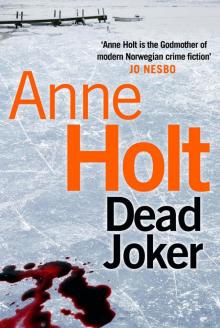 Dead Joker
Dead Joker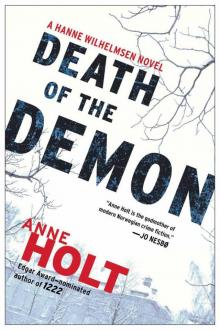 Death of the Demon: A Hanne Wilhelmsen Novel
Death of the Demon: A Hanne Wilhelmsen Novel Punishment aka What Is Mine
Punishment aka What Is Mine Beyond the Truth
Beyond the Truth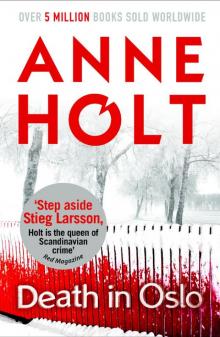 Death in Oslo
Death in Oslo The Blind Goddess
The Blind Goddess What Never Happens
What Never Happens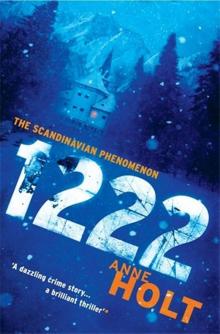 1222
1222 In Dust and Ashes
In Dust and Ashes Odd Numbers
Odd Numbers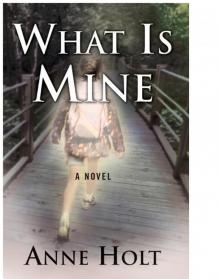 What is Mine
What is Mine What Dark Clouds Hide
What Dark Clouds Hide Blessed Are Those Who Thirst
Blessed Are Those Who Thirst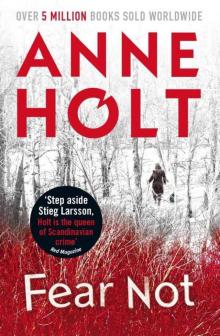 Fear Not
Fear Not No Echo
No Echo Hanne Wilhelmsen - 01 - The Blind Goddess
Hanne Wilhelmsen - 01 - The Blind Goddess